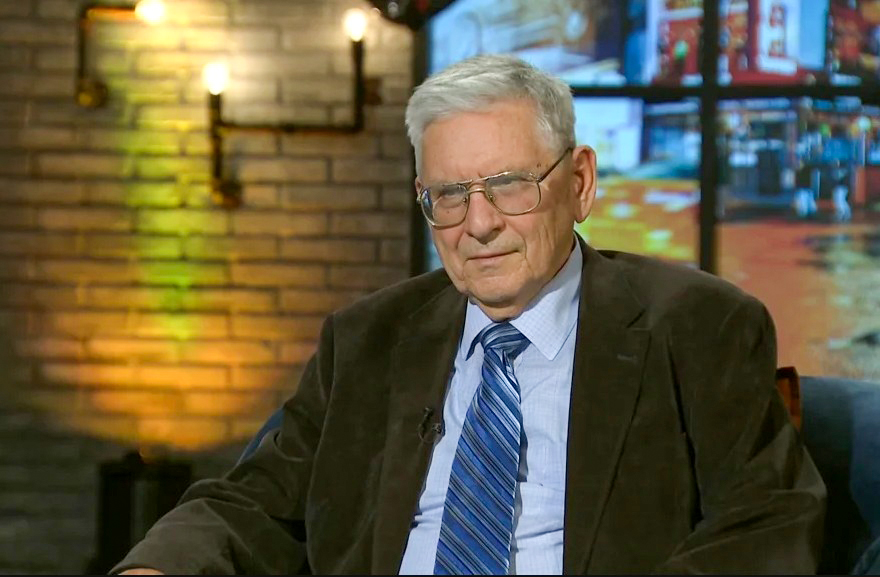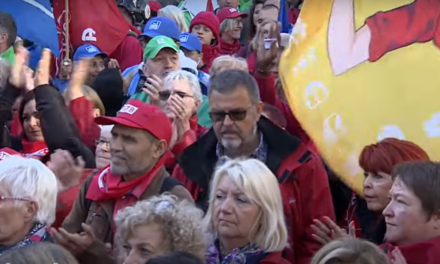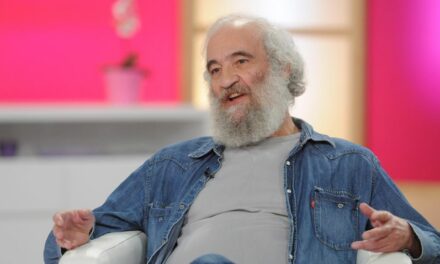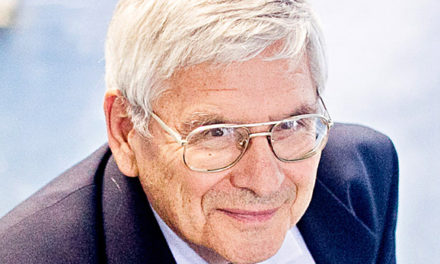Hungary is still fighting for freedom. They want to impose on us a behavior that is fundamentally against the interests of the country, and which we are trying to resist.
For me, October 23, 1956 began as an ordinary weekday, I was 14 years old, in the eighth grade, I didn't know what was going on at the universities. The first news that something special was happening reached us around eight o'clock in the evening, when we heard from Kossuth radio that there was an armed fight in the city. I remember that the radio almost constantly said that armed gangs were rioting, and that anyone who lays down their weapons until then will receive amnesty. It was then that Ernő Gerő's speech was delivered, which after listening to it now, I do not find anything special in it, it completely corresponded to the clichés about imperialism and the glorious Soviet Union that were common at the time, its topicality was only indicated by the fact that it mentioned nationalist demonstrations and well poisoning. However, the speech fired up the fighters, they didn't even put down their weapons, and by morning the radio was already in the hands of the insurgents. The next day, Wednesday, I went to school, but there were no classes, my classmates and I had a fight on the ground, and all we had to do was make posters and put them on the fences in the neighborhood, encouraging the Hungarian people to fight. We lived in Bikszádi utca, about one and a half kilometers south of the Móricz Zsigmond roundabout, there was no fighting in our area, and at first I only saw Russian tanks and Hungarian tanks confronting Russian tanks, and people tried to understand the Russians with their basic Russian knowledge. with soldiers.
Perhaps it is timely to mention that
we didn't hate the Russians, our only wish was what was expressed by the slogan at the time: "Russians, home", and I believe that this was also the main wish of the Russian soldiers.
Perhaps two days passed before we felt that the revolution had won, but in the meantime there was Bloody Thursday, the brother of one of my schoolmates died there, in all probability from the roof of the Ministry of Agriculture in the shooting initiated by the ÁVH, to which the Russian standing in front of the parliament response from tanks, the small bullet holes on the wall of the building show traces of these shots.
The revolution won, and for many of us who were young at the time, the happy feeling that the Russians will leave and we will be free remains unforgettable. During my later life, I thought a lot about this feeling, because I never felt like it again, especially not during the regime change, when it was clear to me, who dealt with national economic issues according to my job, that now freedom had not come, but political slavery was being replaced by economic slavery .
Because what was his demand in '56? Free, independent, neutral Hungary. When Mindszenty came out of prison, he gave a speech in which he spoke about "private property correctly and justly limited by social interests". At the time of the system change, I often thought that with this understanding, I would probably only be accepted into Thürmer's Workers' Party.
But while we're on the subject of Mindszenty, let me quote something else from that speech, which I still find heartwarming today: "We Hungarians want to live and act as flag bearers of the family, intimate peace of the European peoples. Not artificially advertised, but with genuine friendship with all of them. In fact, raising our eyes to even more landscapes: we, the small nation, wish to be in friendship, undisturbed, peaceful, mutual respect with both the great United States of America and the mighty Russian Empire. Good neighborly relations with Prague, Bucharest, Warsaw and Belgrade. And in this regard, I must mention Austria as the fraternal behavior shown in connection with our current travails has already been taken to heart by all Hungarians."
The fourth of November 1956 was a Sunday, and it was like that on Monday normal life begins, work starts, factories produce, we go to school. Early in the morning we were awakened by loud bangs. We turned on the radio, and that's when Imre Nagy's often-quoted radio speech was heard: "This morning, the Soviet troops launched an attack on our capital, with the obvious intention of overthrowing the legitimate Hungarian democratic government. Our teams are in battle. The government is in place. I am announcing this to the people of the country and to the public opinion of the world." ; and then the national anthem. Even today, these words ring in my ears, and the phrase "our troops are at war" has become a catchphrase, and I often use it myself when I have to fight for hard-to-reach goals.
I didn't take part in the fights that followed, even though there were fierce clashes a quarter of an hour's walk from us, on Móricz Zsigmond Square, but when I wanted to leave, my mother, who was a real politician, gave me two damning slaps, so I didn't become a hero or a hero's dead. "You still deserve to be a heroic dead - it's not important for a mother to raise a child until the age of 14," my mother said, and she was probably right. But many people went and many died, 1956 for me is primarily about those who sacrificed their lives for the hope of the country's freedom.
Because what does freedom mean? That I can determine what I think and how I live.
That I don't have to think that Stalin is our heroic leader, that Soviet scientists invented all technical innovations, that communism is the pinnacle of human development, or that NATO protects Hungarian interests.
Since I feel that we are still fighting a fight for freedom, I have often thought about whether this fight, which was often doomed to failure in Hungarian history - let's think of 1848 in addition to 1956, for example - will bring its results, is it not in vain blood or financial sacrifice? I myself tend to identify with the lines of Petőfi's poem "Song of the Wolves": " We are cold and hungry / And our sides are shot through, / We share all misery... / But we are free!" I am not quoting the poem by chance, freedom is not given for free, with blood or hunger, but you have to pay for it. The English, for example, did badly economically when they left the union, but they have become their own masters, they don't have to dance according to the rarely thought-out provisions of Brussels.
The war of independence in 1848 was also lost, but after the settlement that followed, Hungary started to develop really quickly, from a backward agricultural country to a country with considerable industry in a few decades, so that even after the trauma of the First World War, we were at the forefront of many industries in the world. The same can be said about 1956, the Kádár system was significantly different from the Rákosi system. Today, historians, who want to meet the requirements of the time in every era, often conflate the two systems, but those who have experienced it know the difference between serving foreign interests 110 percent ("right, Comrade Biszku" - if anyone remembers the story) and the utilization of the possible room for movement.
Hungary is still fighting for freedom. They want to impose on us a behavior that is fundamentally against the interests of the country, and which we are trying to resist. However, resistance comes at a price.
Hungary first became a bad boy in the eyes of Brussels and Western speakers in general when it prevented foreign-owned banks from taking too much money out of the country in the early 2010s. Later, the hysteria against us reached its peak when we built a fence to prevent mass, uncontrolled and illegal migration. We came face-to-face with the voices of the West also because of the rejection of gender ideology that destroys society, and not least because we are not willing to support with weapons the massacre that is taking place in order for NATO to push its borders another thousand kilometers further east, in stark contrast to the promises made to Gorbachev.
If we don't want to be a Hungary like Frankistan and Germany, if we don't want to accept ideologies that are anti-family and anti-social, if we don't want to participate in wars that arise from the power obsession of a handful of groups, there is a price, and in my opinion, this price is paid by the interests of the country and our own to protect our dignity we must pay.
Author: Károly Lóránt, economist, advisor to the National Forum, member of the C12 group
Source: Magyar Hírlap
Cover image: Károly Lóránt / PS TV screenshot












